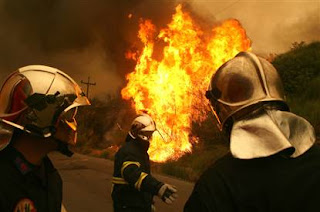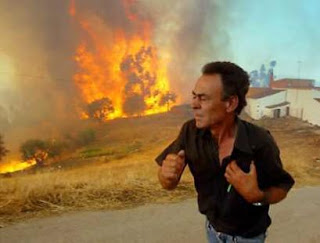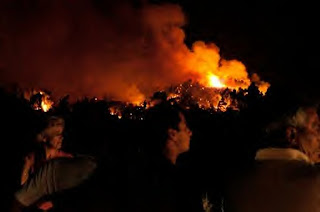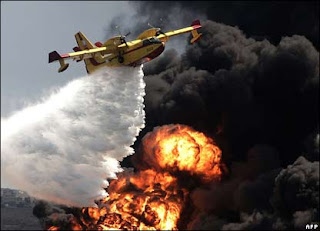Greek Wildfires: Terrorism or Lack of Firefighting Resources?
Lack of Resources, Arsonists Plague Greek Firefighting Effort
 Greek government declared a countrywide state of emergency to help mobilize resources to fight the far-reaching wildland fires, that are being blamed on arsonist and terrorists. The worst fires are concentrated in the mountains of the Peloponnese Peninsula in southern Greece and on the island of Evia north of Athens.Tuesday morning, firefighters said 89 new fires broke out overnigjht and dozens of others were burning throughout the country unchecked.
Greek government declared a countrywide state of emergency to help mobilize resources to fight the far-reaching wildland fires, that are being blamed on arsonist and terrorists. The worst fires are concentrated in the mountains of the Peloponnese Peninsula in southern Greece and on the island of Evia north of Athens.Tuesday morning, firefighters said 89 new fires broke out overnigjht and dozens of others were burning throughout the country unchecked.The firefight is proving to be very difficult as poorly-equipped municipal firefighters muster citizens to serve on hand-to-hand bucket brigades in some places. France, Italy, Cyprus and Israel have sent firefighters, with aircraft coming from France and Italy, sources reported. A s of this writing another 12 countries were sending reinforcements.
Blazes came within inches of destroying the museum at Olympia, housing famous classical sculptures such as Praxiteles' Hermes. But air tankers, helicopters and scores of firefighters beat it back. 60 Firefighters and 6 engines remain on the scene in case the blaze flares up again.
“The destruction is of biblical proportions,” Nicholas Orphanos, a volunteer firefighter in the Peloponnese, told Reuters. “There are villages we want to go to (but) cannot because the roads are blocked. In 30 years, I have never seen such destruction.” (2)
According to conservative estimates, 110 villages have been razed to the ground, six and a half million acres of farmland consumed, and countless acres of pine forest and olive groves reduced to cinders. “Much of Arcadia, in the central Peloponnese, a prime tourist attraction, is reminiscent of moonscape and thousands of rural Greeks fear financial ruin.” reported The Guardian. (3)
On Monday, Prosecutor Dimitris Papangelopoulos ordered an investigation into whether the fires could have been the work of terrorists. 33 people have already been arrested on suspicion of arson, including an elderly woman who was cooking outside her home.
 With all of the unrelated, spontaneous outbreaks, one can accept the fact that these fires are arson in nature. But the real problem here isn’t terrorism, it is Greece’s inability to deal with large scale fires of this nature and magnitude. In a country whose landscape is much like that of California, there is no dedicated Forest Firefighting service, no incident command system and nothing even close to hot shot teams. Without the ability to build and maintain firebreaks, these massive blazes simply roll across the landscape, fed by hot, dry winds from the Middle Eastern deserts.
With all of the unrelated, spontaneous outbreaks, one can accept the fact that these fires are arson in nature. But the real problem here isn’t terrorism, it is Greece’s inability to deal with large scale fires of this nature and magnitude. In a country whose landscape is much like that of California, there is no dedicated Forest Firefighting service, no incident command system and nothing even close to hot shot teams. Without the ability to build and maintain firebreaks, these massive blazes simply roll across the landscape, fed by hot, dry winds from the Middle Eastern deserts.
In 2003, the Greek government appropriated 18 million Euros to revamp the Greek Fire Service. There were to be 735 new firefighting vehicles, new protective gear for firefighters, new fire stations, in addition to helicopters and fireboats. The idea was to place the Greek Fire Service on equal footing with the USA, UK, Sweden and Germany. But somehow that procurement came up short, and only 50 apparatus were actually delivered -- all of them to Athens. Some claim that government’s investment was a ruse, simply to impress foreign visitors who attended the 2004 Summer Olympic Games.
In recent months, there have been complaints of inefficiency of the fire service in Greece. Average response times by fire units serving rural areas is 35 minutes – and remember, that’s the average. This is compounded by the fact that Greek government recently prohibited the use helicopters for the firefighting for fear that such operations would create additional power cuts, a common occurrence in rural Greece.
 And then there are the politics of natural disasters. In a move reminiscent of FEMA’s response to Katrina, government in Greece has firmly placed the blame on someone else – in this case the unseen terrorist. That’s understandable -- if you’re an idiot. National elections are in 3 weeks, and Greek Prime Minister Costas Karamanlis would prefer to be viewed as a hero – not the one responsible for cutting funding for firefighters and firefighting.
And then there are the politics of natural disasters. In a move reminiscent of FEMA’s response to Katrina, government in Greece has firmly placed the blame on someone else – in this case the unseen terrorist. That’s understandable -- if you’re an idiot. National elections are in 3 weeks, and Greek Prime Minister Costas Karamanlis would prefer to be viewed as a hero – not the one responsible for cutting funding for firefighters and firefighting.
The problem of controlling the huge fires is a general lack of investment in firefighting equipment and personnel, reports the popular UK-based blog EU Referendum. “ In Greece,’ the blog reports, ‘investments happen only after the horse has bolted". (4)
 And then there are the politics of natural disasters. In a move reminiscent of FEMA’s response to Katrina, government in Greece has firmly placed the blame on someone else – in this case the unseen terrorist. That’s understandable -- if you’re an idiot. National elections are in 3 weeks, and Greek Prime Minister Costas Karamanlis would prefer to be viewed as a hero – not the one responsible for cutting funding for firefighters and firefighting.
And then there are the politics of natural disasters. In a move reminiscent of FEMA’s response to Katrina, government in Greece has firmly placed the blame on someone else – in this case the unseen terrorist. That’s understandable -- if you’re an idiot. National elections are in 3 weeks, and Greek Prime Minister Costas Karamanlis would prefer to be viewed as a hero – not the one responsible for cutting funding for firefighters and firefighting.Resources:
(1) BBC World News
(2) Reuters News Service
(3) The Guardian
(4) EU Referendum
Specialty Websites
Find Members Fast
Firefighting Videos
© 2026 Created by Firefighter Nation WebChief.
Powered by
![]()
Badges | Contact Firefighter Nation | Privacy Policy | Terms of Service

You need to be a member of My Firefighter Nation to add comments!
Join My Firefighter Nation